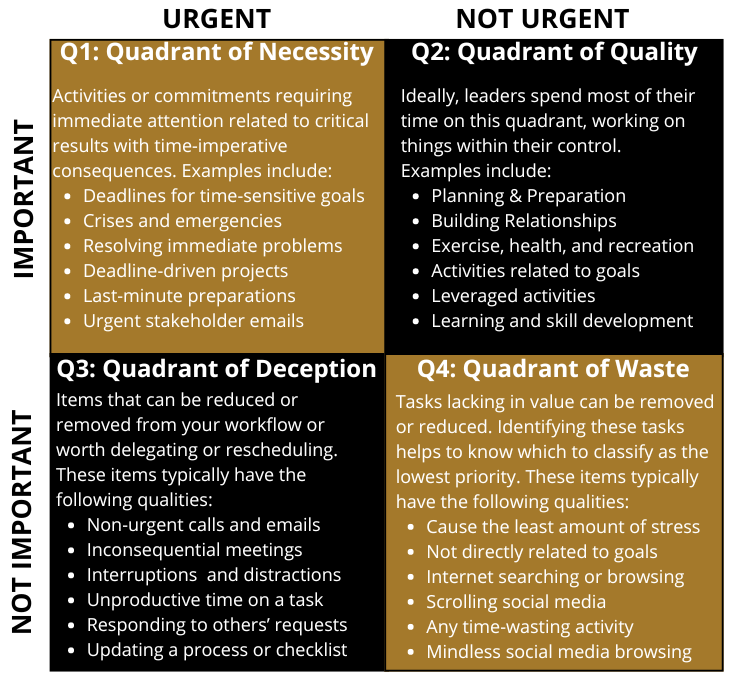Managing Daily Operations while Planning for Growth
How can I balance my time between managing daily operations and planning for growth?

Business leaders often ask this question whether they own their own business or are leaders within a business and responsible for achieving growth.
There is a way that requires commitment, discipline and planning. This is easy to do, mainly when you are intrinsically motivated to achieve what you have set out to do. People often use the word balance thinking that it can be achieved. However, balance implies that we must be equal on both sides. It is more realistic to achieve harmony between the daily operations and the strategies being worked on to achieve growth or to scale the business. Effective planning enables the achievement of goals aimed at growth while also navigating the daily whirlwind operations of any business. This is because an effective plan requires prioritisation to achieve the various goals and activities within the plan. Why create a plan if there is not an intention to execute it? Effective plan execution involves prioritisation and breaking the plan into manageable focus areas. It is about putting the priorities first and ensuring they get the focus they require while also managing the urgent and important daily activities and giving them the focus they deserve.
In his seminal book, 'The 7 Habits of Highly Effective People', Stephen R. Covey highlights habit 3, 'Put First Things First,' as a natural emergence of habit 1 and 2 and exercising independent will toward becoming principle-centred. When you have developed a proactive nature influenced by the first two habits, you enable yourself to be principle-centred by practising self-management.
Putting first things first is about halting procrastination and getting on with things! It is about prioritising effectively and avoiding wasting time. It’s easy to avoid challenging activities and get on with those that feel more comfortable to focus on. Still, ultimately, this leads to important things being left behind, which comes with consequences. When we don’t put things first in the work environment, we often do the activities we like and know we’re good at and neglect the more important tasks that support our business growth.
Putting first things first is an essential component of effective self-leadership. When we practice this habit, we consider the impact of our actions on ourselves and others, which helps us remain disciplined and retain personal integrity. Building this habit into our daily work lives also helps us bring focus and energy to our actions, making progress while developing greater self-trust and keeping commitments.
"The key is not to prioritise what's on your schedule, but to schedule your priorities.” Stephen R. Covey
The Covey Time Management Matrix focuses on allocating task time per quadrant. It is similar to the Eisenhower Matrix. However, unlike Eisenhower, whose quadrants represent the tasks based on urgency and importance so you can establish an efficient workflow, the Covey Time Management Matrix quadrants represent time allocation based on priorities. Effectively using your time is essential to increasing personal productivity and enhancing the success of any business. This matrix helps us prioritise and focus on the tasks that matter most. As Stephen R. Covey wisely says, “The key is not to prioritise what's on your schedule, but to schedule your priorities.”

Here are some tips for planning how to put first things first to manage daily operations and still achieve growth:
Tip #1 - Identify the activities that are important and not urgent.
Prioritise the list of important and not urgent activities above all. These activities will be related to the goals in the 12-month business plan for success. Create a list of these high-priority activities in order of importance—Utilise Covey’s time management matrix to help you decide what to prioritise.
Tip #2 - Create a list for one quarter.
Use this list of priority goals or activities to create a list for one quarter or three months. Breaking activities into quarters enables greater focus so that energy and effort can be put into achieving the actions. At the end of the quarter, there will be more significant progress towards the growth goals.
Tip #3 - Allocate time and resources to the list of priorities for growth.
Consider this 'deep work' time allocation with no interruptions. Identifying and allocating time is crucial, as everyone has a different ideal focus for work time. This is the time to do the important, not urgent, activities. The rest of the day is for the important and urgent ones, which will always distract you from the activities moving the dial in the business.
Tip #4 - Review the priorities monthly, weekly and daily.
Review the list of quarterly priorities each month to determine which things go first. Decide which will be the priority focus each week and which will be the priority focus each day. This approach supports building strong planning habits, and with consistency, it becomes straightforward to do daily, weekly, and monthly.
Tip #5 - Review and repeat quarter by quarter
Repeat the quarterly planning four times a year as you manage daily operations while executing your growth plan. Test and measure to learn what time allocation, resourcing, and priority listing works best. Within one year, there will be a significant change in how daily operations are managed while keeping the finger on the pulse for planning business growth.
Taking this approach by prioritising the importance and urgency of tasks is crucial to managing daily operations while focusing on planning for growth. This high-level insight aims to spark a different way of thinking regarding planning. This quote from Johann Wolfgang van Goethe, the German statesman, summarises putting first things first very effectively: "Things that matter most must never be at the mercy of things that matter least."
Book a complimentary strategy session to learn more about using planning to prioritise focus and achieve growth. We will look forward to connecting.





